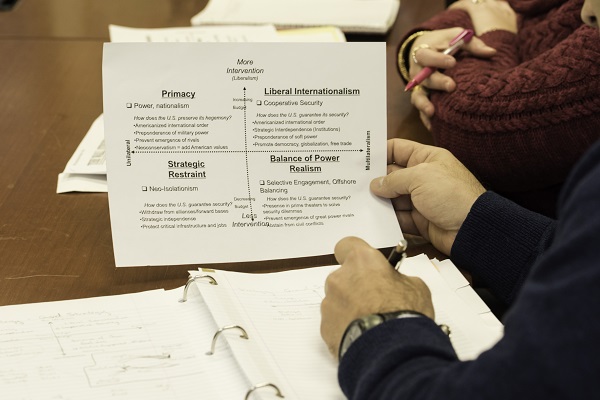Strategy & Policy
The Strategy and Policy course examines how to think strategically and to prepare for positions of strategic leadership, it also covers the relationship between war’s purpose, objective, and means. In addition, students will be asked to think in a disciplined, critical, and original manner about the international strategic environment, about a range of potential strategies, and about the strategic effects of joint, interagency, and multinational operations.

About the Course
This course adopts an interdisciplinary approach to strategy, drawing on the disciplines of history, political science, international relations, and economics. It is designed to prepare senior military officers to:
- Be proficient in strategic decision-making involving Maritime, Joint, Interagency and Multinational Warfighting, applying sea power and integrating it with other military capabilities and other national instruments of power.
- Be prepared for positions of strategic leadership, focusing on the ability to think strategically about all types of wars and strategic actors, to evaluate alternative courses of action, and to write clearly and speak articulately about the relationship between grand strategy, policy, and operations.
- Be competent in strategic-level problem solving, demonstrating critical thought based on a wide range of classical and contemporary strategic concepts and grounded in the decision-making of historical, real-world strategic leaders.
- Be effective maritime spokespersons who understand warfare at sea, based on the classic works on sea power and maritime strategy, and conversant with the full range of naval capabilities.
Core Components
The curriculum consists of two core components: an examination of leading strategic theorists on war and an analysis of major case studies. Students will learn from major strategic thinkers to build an analytical framework that can be used to understand the interrelationship between the realms of policy, strategy, and operations. Case studies provide an opportunity to evaluate and discuss ways in which political leaders and strategic planners in the real world have successfully or unsuccessfully grappled with the challenges associated with the use of force to attain national objectives
All students are required to write two papers that critically examine significant questions arising from the case studies. These papers present an opportunity to demonstrate critical analysis and prepare a paper that requires independent thought and graduate-level writing. Papers should serve to stimulate innovative thinking and to provide provoke and inform discussion within the seminar.
Visit Department
